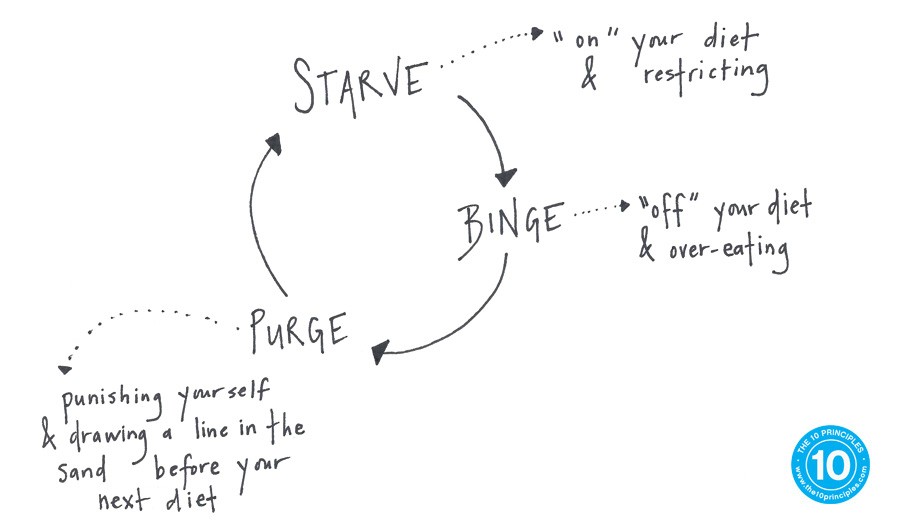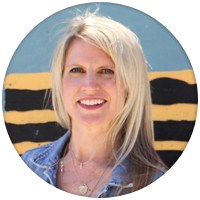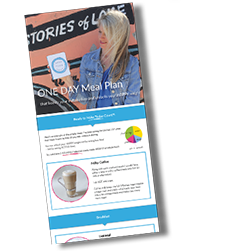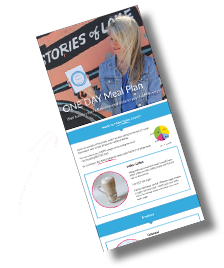
- OCD and eating disorder help redirects your energy so you’re super productive
- What my OCD and eating disorder looked like & how I got healthy 22+ years ago
- My interview as a Guest Expert on Navigating Recovery Podcast
OCD and eating disorder help
After I’d been caught in the starve-binge-purge cycle for 5+ years, I asked for help.
Very quickly I was diagnosed with OCD.
Discovering I had Obsessive Compulsive Disorder was a huge relief.
It helped me:
- Forgive myself for all the times I shouldn’t have been disappointed in myself
- Look for self-defeating patterns in my day-to-day life
- Break those patterns
- Build healthy habits
- Get FREEDOM from worrying about food, weight and hunger
Now that I understand my OCD and eating disorder I can redirect that energy
These days my perfectionist energy is my superpower because:
I have the tools to stop getting lost in the details
so I can keep moving forward.

So I want to tell you:
You can get healthy!
In fact, you can make food a COMPLETE non-issue and come back from this difficult experience knowing yourself even better, so you can do life better. xo
What’s OCD?
Obsessive Compulsive Disorder (OCD) is a mental health condition. People with OCD have unwanted and repetitive thoughts and fears (obsessions) that make them feel driven to do certain behaviors over and over again (compulsions) in an effort to get rid of the stress. However, the urges keep coming back. Which can lead to ritualistic behavior.
And more stress.
This is known as the vicious cycle of OCD.
These obsessions and compulsions:
- get in the way of day to day activities, like getting to work on time
- cause anxiety so you feel nervous, worried and full of unease about an upcoming event
- affect the quality of your life
But… there are solutions to OCD and eating disorders!
Here’s a snapshot of my OCD and eating disorder experience
Dieting made me scared to eat almost every kind of food, though I’d do my best to pretend to eat normally around other people so they wouldn’t interfere with my weight-loss plans.
I wanted to be left alone to follow, to a T, the diet rules, tips and tricks that I’d read in magazines.
And when I had to eat in public, I always covered my mouth with my hand because I was embarrassed to be seen eating.
For years I’d been working so hard to lose weight, but gaining it instead.
I hated being misrepresented.
I was sure I had a slow metabolism. And wondered…
“If I’m eating this little and I’m 30 pounds overweight…
imagine if I ate an actual meal
like everybody else.”
It got to the point in university that I was living on diet coke, rice cakes and apples… unless I was going to purge.
Sometimes I’d purge up to 5 times a day.
But now I’ve been healthy for the last 22+ years
Recovery is possible!
In fact, big problems don’t need big solutions.
It was very small changes and GOOD information that allowed me to:
- start eating regular meals
- have a healthy relationship with exercise
- and to my surprise… unlock my HAPPY weight.
I lost 30 pounds by eating more and exercising less.

OCD and eating disorder statistics
Since 1939 research has been done on the parallels between OCD and eating disorders.
Lots of studies have found that people with disordered eating have statistically higher rates of OCD: between 11% to 69%.
And people with OCD have higher rates of eating disorders: between 10% to 17%.
In fact:
64% of individuals with eating disorders also possess at least one anxiety disorder, and 41% of these individuals have OCD in particular.
-Kaye WH, Bulik CM, Thornton L, Barbarich N, Masters K, “Comorbidity of anxiety disorders with anorexia and bulimia nervosa.” Am J Psychiatry, 2004; 161 2215-2221. 2. Yaryura-Tobias JA, & Neziroglu F (1983). “Obsessive Compulsive Disorders Pathogenesis Diagnosis and Treatment.” New York Marcel Dekker
What my OCD and eating disorder looked like
Your experience or your loved one’s experience might be different.
But look for parallels.
Being able to spot OCD and eating disorder signs,
is an important first step in breaking self-defeating behaviors
& building habits that set you up for success.
My eating became disordered when I started dieting at 14 years old.
I gained a little weight over the summer break between Gr. 8 and the start of high school, when we drove across Canada on a family car trip.
Looking back the extra weight shouldn’t have been a surprise.
Instead of having a peanut butter sandwich, apple and juice box at lunch, like I usually did during the school year, we stopped at diners and had French fries, milkshakes and hamburgers.
And rather than running most days to train for cross country, like I did all fall, winter and spring, I was sitting in our car for hours a day.
Also it was the summer I hit puberty.
When my weight gain was pointed out to me
…I worried I was making the people around me embarrassed.
I wanted them to be proud of me!
Getting straight A+’s at school, being athlete of the year and on Student Council was my way of being an easy kid. I thought excelling at all those things would mean nobody had to worry about me.
When my extra weight was pointed out, I INSTANTLY had a new project I wanted to excel at.
So I went on a crash diet
I thought dieting was the right thing to do.
But all the food restrictions I read in magazines, like:
- only eat fruit before noon
- just eat the white of an egg (never the yolk!)
- blot your pizza before eating
- never eat white bread, only brown
- avoid fat
made eating super complicated and kept me feeling hungry.
(And guilty! No matter what I ate.)
Eventually I’d be so hungry I couldn’t think about anything else
(For years I thought I was addicted to food.)
So I’d completely break my diet and eat all the forbidden foods I’d blacklisted, like:
- donuts
- cookies
- ice cream
and so on…
(Food I never normally wanted until I started dieting.)
Overeating was also a way to punish myself for breaking my diet
I thought “bingeing” after all my hard work of restricting and doing tons of exercise, would scare me enough to stick to my diet tomorrow.
Then I’d be full of shame and wonder where my willpower went.
Worrying I wasn’t disciplined enough
to stick to a diet
was all I could think about.
I’d obsess about what I thought was my lack of determination.
(Reality? I was hardly eating anything for long periods of time and the body’s natural reaction is to binge… just like if you don’t drink water for a while you’ll chug it! Your body wants to keep you alive.)

Signs of OCD before my eating became disordered
Since I was a little kid I’d been someone who’d stay up all night studying or do extra running so it was easier to win races and ace exams. And no matter the result, all the extra work I did would ease my anxiety. Because I’d know I tried my best.
I was willing to do whatever was necessary to have peace of mind.
Being a hard worker and seeing things through, was one of the things I liked the most about myself.
As Diana Goodman said about her daughter who had disordered eating:
One of the mysterious things to me is that eating disorders tend to inflict people who are exceptional. Intelligent, wise, beautiful, incredible people… universally exceptional individuals experience eating disorders.
-Diana Goodman, as told by Francis lacobucci

Me at the end of Grade 8 after our Regional Track and Field Day
(reluctantly getting my picture taken!)
& a few months before our family car trip when I gained weight ↑↑↑
Life before I knew I needed OCD and eating disorder help
So after I broke my diet, I’d overeat.
Then restrict even more to try to get back on track.
Soon purging (making myself sick and over-exercising) became part of the vicious starve-binge-purge cycle:

I was always so certain every time I broke my diet, it would be the VERY last time.
So when I mapped out a new diet, I’d make the rules even stricter, because I thought they’d be easier to follow.
Clear boundaries and clear expectations!
So, the moment I ate even a little too much…
Even what I thought was one “extra” bite of whole wheat toast, I’d think:

This line about OCD and eating disorders resonates with me:
….An OCD sufferer can never achieve that “just right” feeling on a specific task…
-Fugen Neziroglu, PhD, ABBP, ABPP & Jonathan Sandler, BA from the International OCD Foundation
For me it was the “just right” feeling of how much I ate.
Everything I’d read about losing weight, was like:
“Eat 6 almonds at 8 pm…”
These precise instructions made me think there was an exactness to eating.
(There isn’t.)
And I became obsessed with trying to eat the perfect amount.
But there’s no such thing so I could never achieve that “just right” feeling.
My OCD thinking was black and white
I was “all” or “nothing.”
And I preferred to crash and burn… than do ok.
I had a fear of getting used to mediocre so I did everything at one extreme or the other.
Overeating drew a line in the sand before I started my new diet, that I’d be hellbent on following perfectly, at the stroke of midnight.
I loved the idea of dramatic change.
Think about it.
We’re brought up on Cinderella stories…
The Ugly Duckling
Rags to Riches
My Fair Lady
Pygmalion
Pretty Woman…
Now add a little OCD and the dream of reinventing yourself with the flick of a switch, is easy to latch onto.
And hard to let go.
OCD and eating disorder Summary
In short, I’d become obsessed with any mistake I made (food I regretted eating) and compelled to:
- punish myself
- draw a line in the sand
- & start a shiny new diet full of promise
I was determined to prove I was determined enough to stick to my diet.

Looking back, it was more important to me to follow my diet perfectly than actually lose weight.
Though I weighed myself and looked at my body in reflective surfaces to see how big I looked All. The. Time.
In both anorexia and bulimia the individual clearly becomes preoccupied by incessant thoughts revolving around body image, weight gain, and food intake, leading to ritualistic methods of eating, dieting and exercising. The common thread linking both of these disorders to OCD is the overwhelming presence of obsessions and compulsions that eventually affects the individual’s daily functioning, even to the extent of becoming incapacitated…
-Fugen Neziroglu, PhD, ABBP, ABPP & Jonathan Sandler, BA from the International OCD Foundation
Just like someone with OCD might check a door over and over again to make sure it’s locked or the stove is turned off or their hair straightener isn’t plugged in… people who have OCD and an eating disorder will keep thinking again and again about that piece of food… that extra bite, they wish they didn’t take.
This kind of thinking is also called a “sticky brain.”
The intrusive thought just won’t go away.
I didn’t realize that I was building bad habits between diets
When I knew I needed OCD and eating disorder help
By my first year of university I’d started punishing myself not just by overeating when I broke my diet, but by making myself:
- miss class
- skip sports
- & cancel anything social
Soon my whole life was pulled into my relationship with food.
And all the things I loved were suffering because I wasn’t showing up if I ate “one bite too many.”
By midterms I realized I couldn’t live with or without my eating disorder.
But I LOVED life!
I ❤️ love life!
I knew I had a huge, beautiful opportunity to have an education,
add something positive to the world in some way…
and to have fun.
And I didn’t want to ruin any more opportunities.
So I made an appointment at the medical center on campus and was referred to a psychiatrist who diagnosed me with OCD.
Boom!
Getting this vital piece of information was just what I needed.
My OCD and eating disorder diagnosis was a HUGE relief!
Finding out I had OCD was like getting a piece of the puzzle that makes the whole picture make sense.
Understanding that OCD and an eating disorder can come hand-in-hand, allowed me to look for patterns, like starving, bingeing and purging… and break them.
Going to the doctor that warm, Friday afternoon in October of 1995 (just before midterms) was the very first turning point for me to learn to live with OCD and overcome my eating disorder.
It’s been 22+ years since I’ve been free of my OCD and eating disorder
While I do have OCD thoughts sometimes, about whether the stove is really off after making porridge in the morning. Or if the fruit I just washed is washed… For the most part I can see when I’m being driven by repetitive and unwanted thoughts.
Like running back to the garage to check it’s locked …again.
And lack of sleep certainly exacerbates my OCD.
But food has been a complete non-issue for 22+ years.

And though it might sound strange, I’m grateful for this experience.
If you gave me a button to remove my OCD and eating disorder from my life
I wouldn’t push it.
It’s brought beautiful:
people,
places
and experiences
into my life and taught me to look for potential…
To see what’s possible…
Rather than just dismiss something or someone because they’re not brand new and in perfect condition.
Like instead of a pure bred dog I way prefer adopting an animal and getting him or her out of a cage and onto the end of my bed.
Here’s my foster dog Rocky:

We brought him home when he was 8 and he turns 16 this March!
And I’ve got a lot more empathy due to my OCD and eating disorder.
If I didn’t understand myself for years, how could I possibly judge someone else?

My OCD and eating disorder went on longer than it needed to
Because I was so ashamed of it.
So I isolated myself with misinformation.
❤️ DON’T SUFFER IN SILENCE ❤️
Ask for help!
And a whole, big beautiful world full of possibility will open up to you. xo
The first 3 steps to my OCD and eating disorder recovery
1. being diagnosed with OCD
2. feeding my body properly
3. building in accountability
For many people the first step is recognizing their Type A personality as they may not have OCD but perfectionism gets them stuck.
Those are the same steps I share with my 1:1 clients and in my group program.
The intersection between OCD and eating disorders
Recently the Navigating Recovery Podcast invited me to share my story.
After years of thinking I’d never tell anyone about my OCD and eating disorder (it even took me 4 years before I told my unbelievably kind and open-minded partner, Alex), I said:
“Sure!”
And just like that (move over Sarah Jessica Parker!) I got to:
Share my OCD and eating disorder story
Being on the Navigating Recovery Podcast was a chance to talk about:
- what my OCD was like before it latched onto an eating disorder
- why dieting is a dumpster fire and OCD is like pouring gasoline all over it
- what my OCD and eating disorder looked like
- some of the warning signs that I needed to ask for help
- my OCD and eating disorder turning points (there’s 5!)
- key support that helped me make a full recovery
- why I’m grateful for my OCD and eating disorder
- what my OCD is like now
- how I help over-achieving (Type A!) women like Chetna break free from her OCD and eating disorder
- the everyone being scared to eat bananas phenomenon
- what I’d tell someone who’s struggling with OCD and an eating disorder
On the Navigating Recovery Podcast I discussed how I got healthy
And how I help other women get healthy.
For years I collected terrible diet information…
But it wasn’t until I got GOOD information that I actually got healthy.
Good information about:
- How our bodies work
(You can lose weight for good, without going hungry.) - What healthy eating actually looks like
(It’s not diet coke and rice cakes, baby!) - How to build healthy habits
(Dramatic change is romanticized… but it isn’t lasting change.)
↑↑↑ Those are actually the 3 Steps in my book!
The 3 Steps that helped me recover.
As I always tell everyone:

Above is the back cover of my book.
For me it’s always been important to be a healthy weight
I just had all the wrong information and ran with it.
So it’s important to me to share healthy eating, exercise and mental health information that:
- gives you tons of energy
- allows you to be super productive between meals
- & unlock your H 🙂 PPY weight
Since I got healthy 22+ years ago, food’s been a complete non-issue
That’s why I’ve been so keen to talk about my story.
And why I share the same information on Instagram, my blog and book that helped me overcome my OCD and eating disorder.
The same information that’s helped my clients stop being bulimic after 28 years and stop counting calories, overeating, and so on.
For years I thought I’d need a lobotomy to get rid of my OCD and eating disorder
But now I know just a few simple changes, changed everything.
I’ve found everyone’s situation is very different, BUT some very small steps help people have the same transformation I had, and be:
- free of their unhealthy relationship with food
- stop dieting
- find out who they are without disordered eating
And make their OCD their superpower again!
An Instagram post of mine is discussed on the Navigating Recovery Podcast
For reference, this is it:
I’m proud of the information I share
Bingeing and purging, emotional eating and over-exercising… all my go-to behaviors when I had disordered eating, are the VERY last thing I’d want to do now.
When I’m coping with anything difficult, I have lots of constructive habits that I do instead.
It was such a good experience to be on the Navigating Recovery Podcast
And Francis and Catherine are some of the kindest people you’ll meet.
Please note, I talked super fast on this podcast.
Like… double my normal speed!
I was nervous because I’m a huge advocate of sharing healthy nutrition information. And they were challenging me on that recovery approach. Which I really respect.
Talking openly about different OCD and eating disorder experiences helps everybody learn
Information that’s triggering for some people
is the same information that saves other people’s lives
Having the chance to share my story on the Navigating Recovery Podcast helped me realize I need to stand tall in sharing the knowledge that got me healthy all those years ago.
Everybody is different and that’s ok!
Find your people and learn from them. xo
Also, their podcast is edited for the interest of time which makes the podcast more monologue style. In real life I’m a back-and-forth banter kind of person. Talking for me is more like tennis with words volley-ed back and forth.
I love to listen.
Being diagnosed with OCD and an eating disorder was just what I needed to get healthy
Here’s the episode where I talk about my OCD and eating disorder:
What about you?
Do you have any questions about OCD and eating disorders?
Let me know in the comments below!
And remember, you can get healthy, live a BIG life and make other people’s life better too.
Recovery IS possible.


 These kinds of meals and snacks unlocked my HAPPY weight 21+ years ago (I lost 30 pounds without dieting!)
These kinds of meals and snacks unlocked my HAPPY weight 21+ years ago (I lost 30 pounds without dieting!)
You'll also be subscribed to my newsletter. Don’t like it? Unsubscribe in one click

 These kinds of meals and snacks unlocked my HAPPY weight 21+ years ago (I lost 30 pounds without dieting!)
These kinds of meals and snacks unlocked my HAPPY weight 21+ years ago (I lost 30 pounds without dieting!)
You'll also be subscribed to my newsletter. Don’t like it? Unsubscribe in one click




Sharing what I learned makes the 10 years I STRUGGLED worth it









Leave A Comment